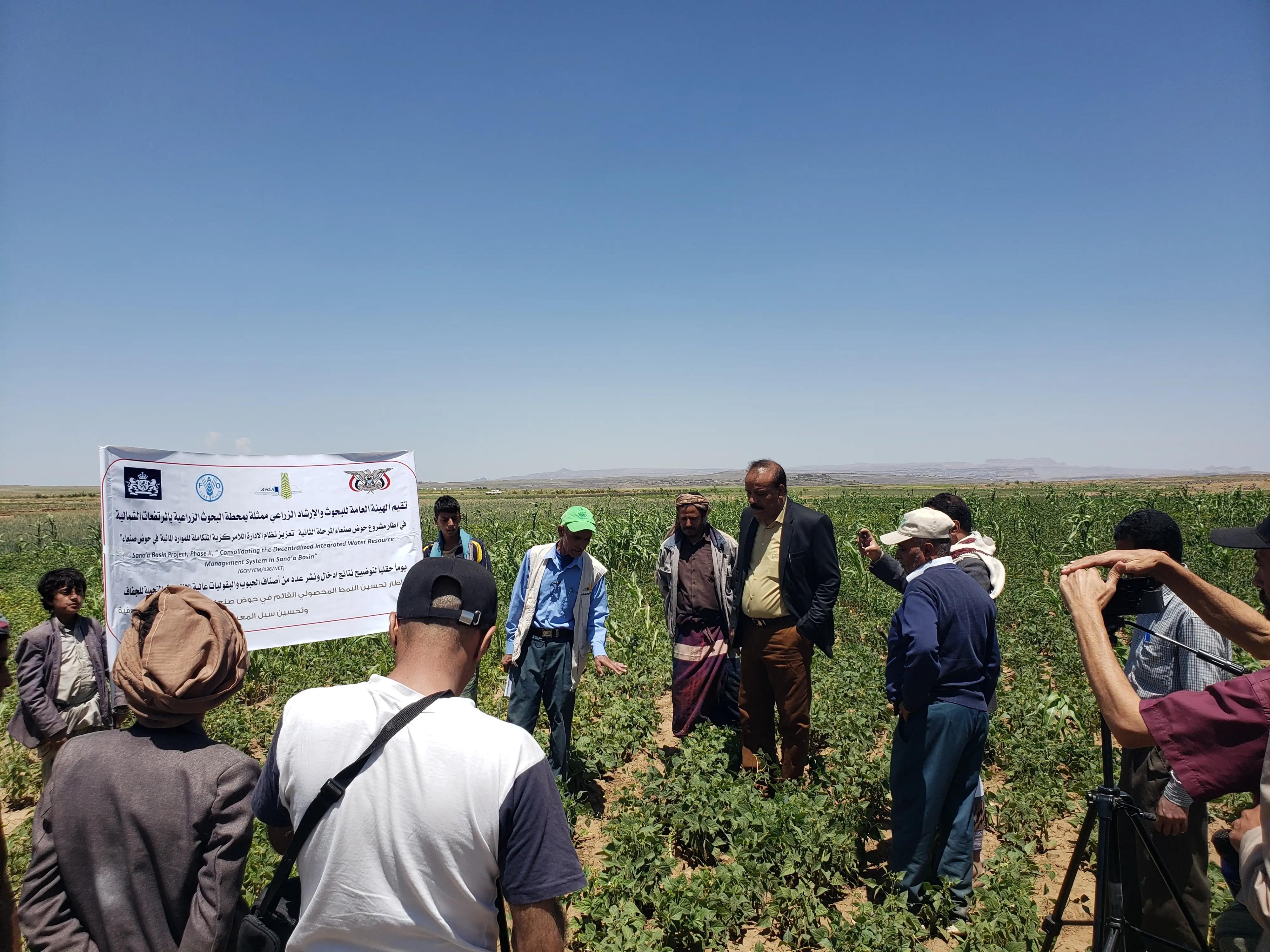A field day was held to evaluate and disseminate released varieties of grains and legumes in Qa'a Suhman, Beit Radam, Da'ar, and Mand in the Bani Matar Directorate of Sana'a.

Sana'a, 5 Rabi Al-Awwal 1445 AH / September 20, 2023 (Saba) - The Regional Station for Highland Research conducted a field day to confirm, evaluate, and disseminate a number of improved varieties of grains and legumes in several farmers' fields in Qa'a Suhman, Beit Radam, Da'ar, and Mand in the Bani Matar Directorate of Sana'a.
The station allocated dozens of sites to distribute 11 varieties of soft and hard wheat, 4 varieties of barley, 7 varieties of legumes, and a variety of highland corn. Additionally, confirmation trials were conducted for 3 varieties of soft wheat and a confirmation trial for mutations in hard wheat to study their success and acceptance by farmers.
During the field day event, Dr. Abdullah Al-Alfi, the President of the General Authority for Agricultural Research and Extension, emphasized the importance of these varieties, which are cultivated over several seasons under rainfed and irrigated systems. The aim is to expand grain cultivation and establish rural seed banks for these improved, high-yielding, and water-tolerant varieties.
Al-Alfi highlighted the significance of establishing rural seed banks to provide farmers with certified, reliable, high-yielding, and quality varieties, thus contributing to enhancing food security for farming households.
Engineer Ahmed Al-Jalal, the Director-General of the Regional Station for Highland Research, stated that these varieties have demonstrated their superiority over the varieties previously cultivated in those areas and their adaptation to the rainfed system. The distribution of these varieties aims to meet farmers' needs for high-quality and high-yielding seed varieties, replacing commercial seeds that lack high productivity, vigor, and purity.
Al-Jalal urged farmers to take care of these varieties, distribute them among other farmers, and preserve and multiply them.
Furthermore, Engineer Ahmed Al-Muallem, the researcher in charge of agricultural and productive characteristics of these varieties, explained their nutritional and industrial advantages. He emphasized that the distribution of these varieties in the region was carried out in collaboration with the Sana'a Basin Water Authority to rationalize and regulate the use of groundwater.
Dr. Abdulhakim Dawood, the researcher in grain crops, stated that the distributed varieties of grains include 11 varieties of soft and hard wheat (Awsan, Dain, Baraqish, Mu'in, Aiban, Ghayman, Faras, Shabam 8, Aqil 2, Naeem, and Suhail), 4 improved barley varieties (Azal, Kokban, Ashmour, and Muhayyib), and a variety of highland corn.
Furthermore, Dr. Naji Zaid, the legume researcher, explained that the distributed legume crops include the Shabam 1 variety of fava beans, Imran variety of peas, and Raqsha variety of kidney beans, in addition to two varieties of lentils and two varieties of fenugreek. These varieties have proven their success under the rainfed system, yielding large quantities and demonstrating resistance to diseases.
The field day was attended by several officials and researchers, including Engineer Hazem Al-Ashwal, the Technical Director of the station, Engineer Hameer Al-Jabali, the grain study researcher, the Director-General of Agricultural Extension and Media at the Ministry of Agriculture and Irrigation, Engineer Hafthallah Al-Qurdi, the Director of the Extension Administration, the Director of Agricultural Extension at the Agriculture and Irrigation Office in Sana'a Governorate, Engineer Ali Mansour, the Director of the Agriculture Office in the Directorate, as well as several farmers and representatives of seed producers' associations in Qa'a Suhman.
..............................///
 English
English
 العربية
العربية
